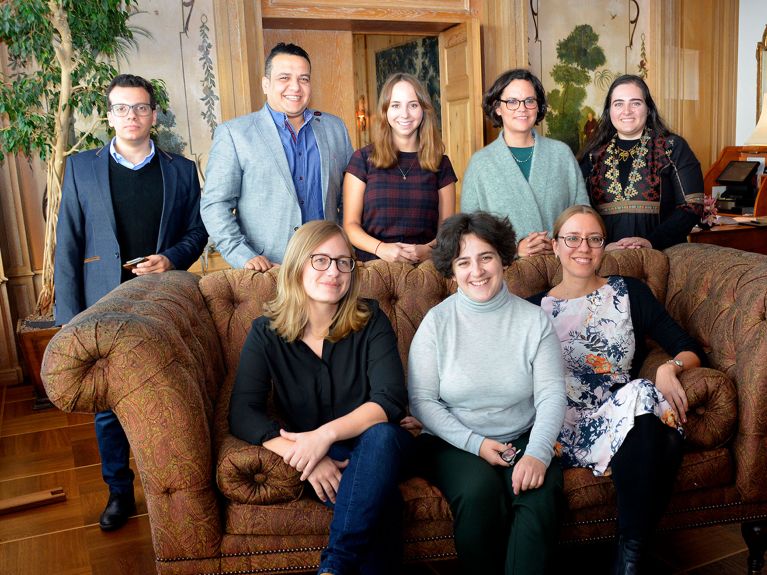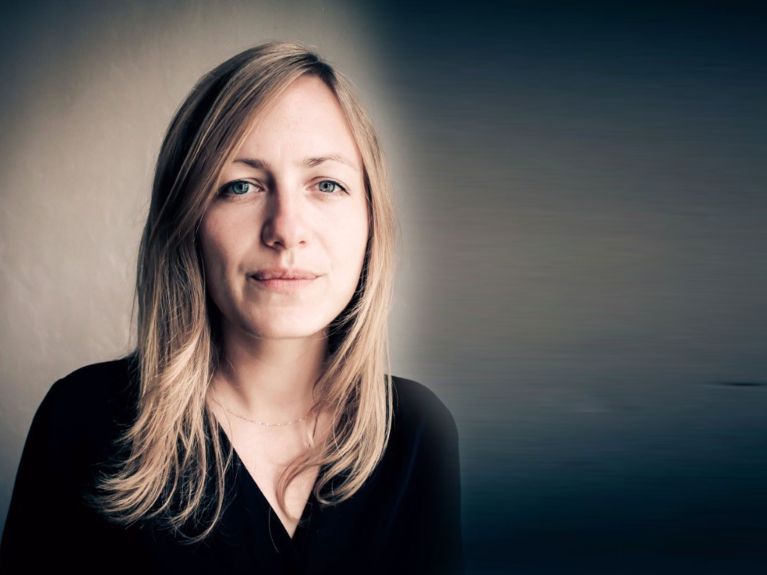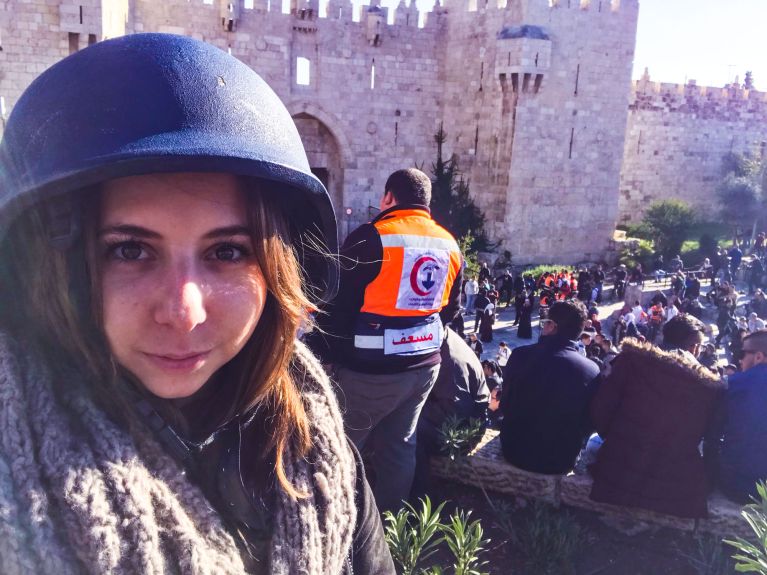An invitation to catch stories
Insider stories from Berlin and Christmas in Jerusalem – with this fellowship, journalists from Germany and Israel discover what issues concern people in the respective other country.

Queues of people started to form in front of the church doors of Dormition Abbey on Mount Zion in Jerusalem hours before the midnight mass was due to start. When Father Nikodemus Schnabel opened the church doors on Christmas Eve hundreds of people thronged in – albeit not Christians, but Jews. Covering this unusual Christmas event in a piece for “Haaretz”, in 2017 Christine Kensche, a reporter for the German daily “Die Welt”, joined the visitors. She came to Tel Aviv with the German-Israeli Journalists’ Fellowship awarded by the association “Internationale Journalisten Programme e.V.” (IJP). For two months, she worked as a reporter for the English-language edition of Israel’s oldest daily newspaper. Prior to that, the 37-year-old had already travelled round the country. “I never had the feeling that I had spent enough time there. The culture, the history, the people – a lot of things fascinate me about Israel, so I applied to IJP and came back.”
“Ignorance leads to prejudice”
Thanks to the fellowship, Kensche got to know the country on an even deeper level. Working at “Haaretz” she obtained an insight into the workflows and special features of Israeli journalism. “The style there is very American. That’s probably because the English-language edition is aimed at Jewish readers abroad, above all in the United States. Reporting is strongly news-oriented, with lots of breaking news and quick, short texts. They quote a lot more too – direct quotes run over several sentences,” explains Kensche. “I had to adapt to it, but it was a very exciting and interesting time.”
IJP’s Ernst Cramer & Teddy Kollek Fellowship is geared towards younger journalists from Germany and Israel. Over the course of a two-month stay, they are expected to familiarise themselves with the political topics of the day in the respective other country and, as future multipliers, concern themselves with issues relating to German-Israeli relations. “Ignorance leads to prejudice. That’s why every German journalist who writes about Israel – and there’s practically no getting around this topic – should have been to the country at least once,” says Kensche.

Focus on exchange and networking
The fellowship is part of IJP’s Middle East Fellowship and is named after the journalist Ernst Cramer and Jerusalem’s former mayor Teddy Kollek. “Above all the idea of exchange is important in this programme. There are 36 German correspondents in Israel, but only one and a half Israeli correspondents in Germany. With this short residence we seek to make a longer-term position attractive and establish a network between journalists,” notes the head of IJP’s Israel programme, Dr. Frank-Dieter Freiling.
He believes that both sides could benefit from this and gain a new perspective on issues facing the other country respectively. “Israeli reporting on Germany is often relatively monotonous – and vice versa too. During their stay, many participants realise that there is great breadth on both sides,” says Freiling.
This is an experience that Liza Rozovsky also shared. She is a reporter for “Haaretz” in Tel Aviv and in 2017 was, as it were, Christine Kensche’s exchange partner. She spent her two-month residence at “Die Welt” in Berlin. She wrote, for example, a story on German parents who live in trendy quarters like Kreuzberg but don’t want to send their children to school there. “I would never have found many of these topics in Israel. You only come across these stories when you are physically there talking to real-life Germans,” states Rozovsky. Yet the story also has a universal character, she notes. “It is about integration and prejudices, not just about Berlin. That’s why the article was also published in “Haaretz”. “Rozovsky didn’t notice any differences in day-to-day editorial practices, also because she was out and about so much – “catching stories”. The only thing was that the newsroom in Berlin is a bit quieter and tidier than in Israel, she says with a wink.
Day-to-day editorial practice: Not here!
Freelance journalist and IJP alumna Sarah Fantl did meanwhile observe a few differences in the editorial department in Jerusalem. She worked as a reporter for “The Times of Israel” in the city: “Unlike in Germany, there was actually no real day-to-day editorial practice. We met for a large conference on Sundays and discussed the new stories. Then we were sent off on our own to do our research.” The 31-year-old loves Israel, but first had to get used to the minor “balagan” (“chaos”). “But you’re always close to the pulse of things working as a journalist here. A lot of time and money is invested in investigative stories.” Fantl went to Israel for two months in 2017 on the IJP fellowship – and stayed there.

German-Israeli Journalists’ Fellowship 2019
For the 16th time, in 2019 the IJP is launching a two-month travel and work fellowship for younger journalists from Germany and Israel. For more information on the programme and how to apply visit: https://www.ijp.org/en/fellowships/the-israeli-fellowship/